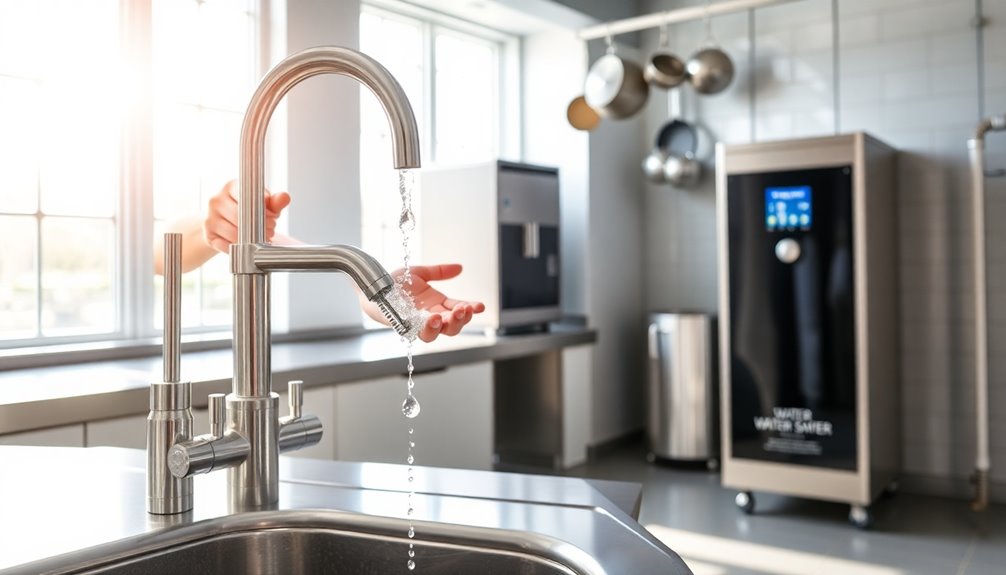To prevent water scale buildup in your commercial kitchen, monitor water hardness regularly, aiming for levels between 3f and 9f. Implement effective water filtration solutions like reverse osmosis systems and water softeners to control calcium and magnesium levels. Schedule routine maintenance for your equipment every 3-6 months, using safe descaling products when needed. Educate your staff on water quality management to enhance efficiency. There's more you can do to protect your kitchen equipment and extend its lifespan.
Key Takeaways
- Regularly monitor water hardness and maintain levels between 3f and 9f to reduce scale accumulation.
- Implement a routine maintenance schedule for equipment inspections and descaling every 3-6 months.
- Utilize reverse osmosis systems and water softeners to effectively remove calcium and magnesium from water.
- Educate staff on water quality management and the importance of proper pH levels (7.0 to 8.5) to prevent corrosion.
- Maintain and replace filtration systems regularly to ensure they effectively reduce impurities and prevent scale formation.
Understanding Water Hardness and Its Impact on Scale Formation
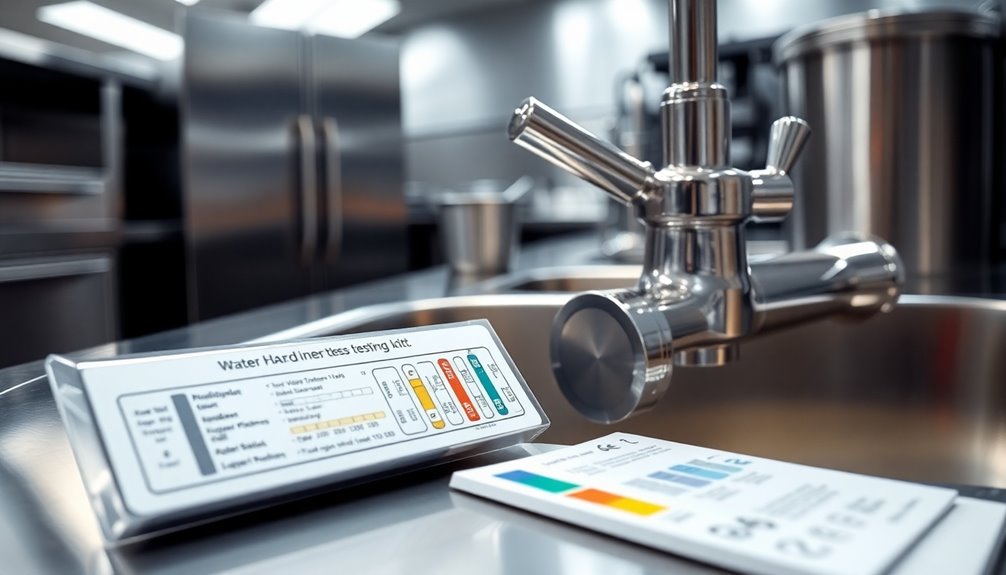
Understanding water hardness is vital if you want to prevent scale buildup in your kitchen. High levels of dissolved calcium and magnesium ions lead to limescale formation, especially when water evaporates during heating.
Ideally, water hardness should fall between 3f and 9f for best kitchen operations. Anything beyond that increases your risk of scale accumulation on commercial kitchen equipment.
Monitoring water quality, including pH and total dissolved solids (TDS), is important to maintain efficiency; keep TDS levels between 40-150 mg/L.
Implementing water treatment systems like water softeners can greatly reduce the adverse effects of hard water and help you maintain your equipment.
Take these steps to guarantee your kitchen stays free of pesky limescale deposits.
Importance of Regular Water Quality Monitoring
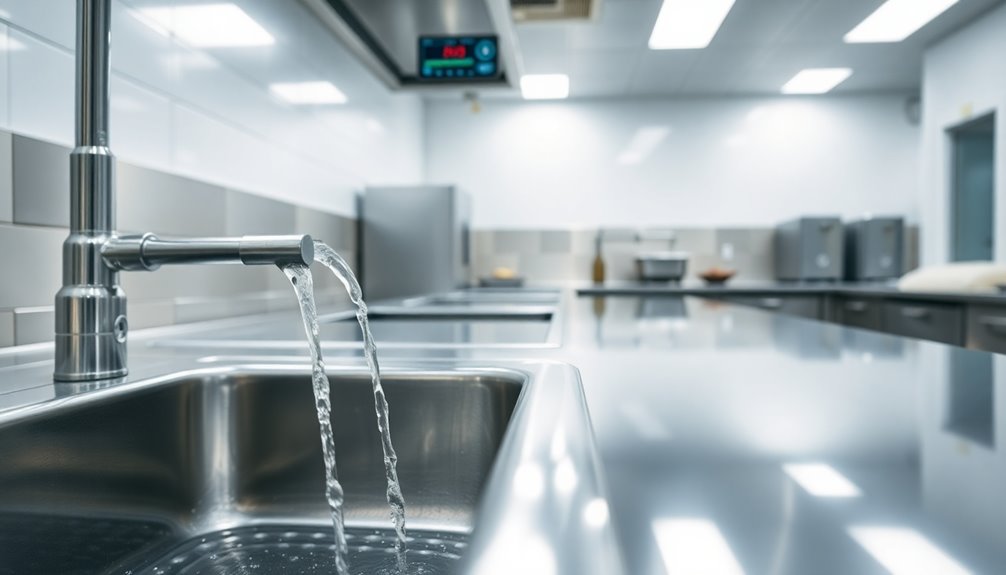
Regular water quality monitoring plays a significant role in preventing scale buildup in your kitchen. By keeping an eye on hardness levels, ideally between 3f and 9f, you can minimize limescale formation that affects your equipment.
Tracking total dissolved solids (TDS) helps manage mineral content, with levels between 40 and 150 mg/L being ideal. Monitoring the Langelier Saturation Index (LSI) guarantees your water remains balanced, avoiding corrosive conditions.
Regular checks on chloride levels, keeping them below 20 mg/L, reduce corrosion risks, further preventing scale buildup. Implementing a consistent water testing schedule allows for proactive maintenance, guaranteeing your equipment operates efficiently and reducing costly repairs. Understanding the importance of regular filter replacement can also be beneficial for maintaining overall equipment performance.
Prioritizing water quality is essential for a smooth-running commercial kitchen.
Effective Water Filtration Solutions
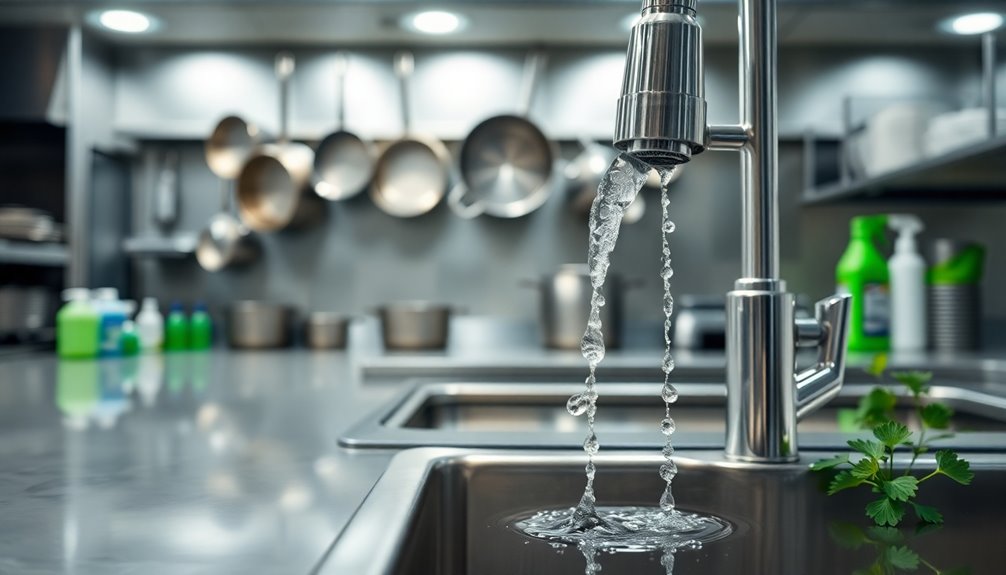
How can you guarantee your kitchen maintains high water quality and minimizes scale buildup? Implementing effective water filtration solutions is key. Consider using reverse osmosis systems to remove impurities, including hard minerals that lead to scale formation. Water softeners can considerably lower calcium and magnesium levels in hard water, protecting your equipment. Moreover, incorporating solar-powered solutions can further enhance your kitchen's sustainability and efficiency.
| Filtration System | Benefits |
|---|---|
| Reverse Osmosis | Removes impurities, enhances water quality |
| Water Softeners | Reduces limescale risk |
| Carbon Block Filters | Improves water quality, reduces scale formation |
Regular maintenance of these filtration systems guarantees they work efficiently, preventing scale buildup that can impact food safety and increase energy costs. Prioritize your water usage and keep your kitchen running smoothly.
Best Practices for Equipment Maintenance

Maintaining high water quality is just the beginning; keeping your kitchen equipment in top shape is equally important.
Regularly inspect and descale your equipment, like steamers and dishwashers, every 3-6 months to prevent limescale buildup and guarantee peak performance.
Regular inspections and descaling of steamers and dishwashers every 3-6 months ensure optimal performance and prevent limescale buildup.
Establish a routine maintenance schedule that includes water quality testing to monitor hardness levels and adjust your filtration methods as needed.
Utilize appropriate delimers, such as phosphoric acid-based products, to safely remove limescale without harming your equipment.
Don't forget to maintain and replace water filtration systems regularly to avoid contaminants that lead to scaling. Additionally, consider incorporating HEPA filters in your air purification systems to further enhance overall kitchen air quality.
Educating Staff on Water Quality Management
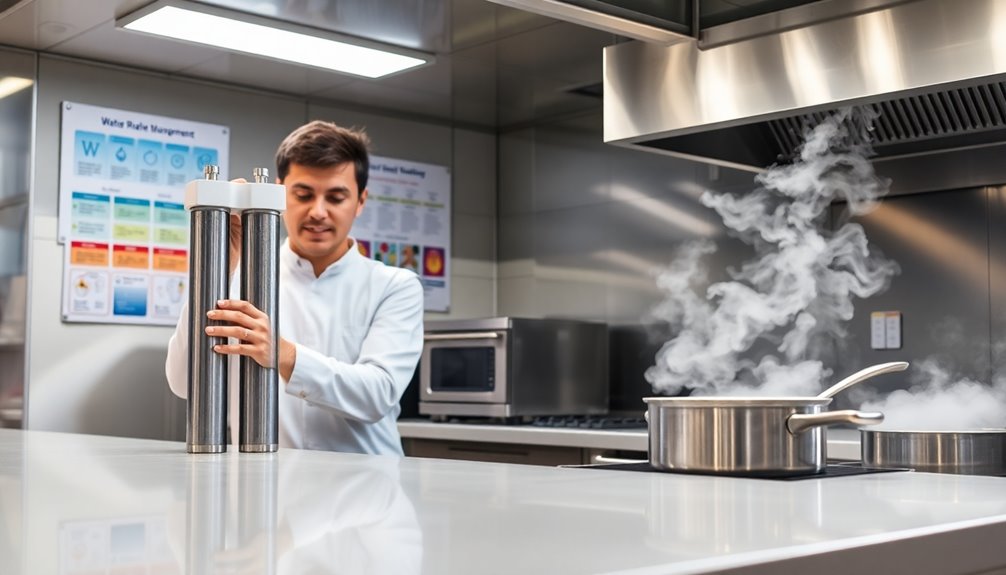
While you might focus on equipment upkeep, educating your staff on water quality management is equally essential for preventing scale buildup.
Training them on the impact of hard water, particularly high calcium and magnesium levels, can greatly reduce maintenance costs and enhance equipment performance.
Regularly monitoring water hardness levels with titration kits empowers your team to identify when water treatment measures, like delimers or water softeners, are necessary.
Emphasizing the importance of maintaining proper pH levels between 7.0 and 8.5 helps prevent corrosion and scaling in appliances. Additionally, understanding federal funding can provide resources for implementing effective water treatment solutions.
Frequently Asked Questions
How to Prevent Hard Water Scale?
To prevent hard water scale, start by testing your water's hardness regularly to know what you're dealing with.
Consider installing a water softener or reverse osmosis system to reduce mineral content.
Implement a routine cleaning schedule using suitable delimers to tackle existing deposits.
Keep an eye on your water's pH, maintaining it between 7.0 and 8.5.
Finally, educate yourself and your team about proper maintenance practices to minimize scale buildup effectively.
How Do You Reduce Limescale Build Up?
You might think limescale buildup is inevitable, but you can effectively reduce it.
Start by regularly testing your water hardness with a titration kit to identify the right treatment solutions. Consider installing water softeners to lower calcium and magnesium levels.
Schedule routine maintenance checks and use delimers with acids to tackle existing deposits. Maintaining ideal water quality, like pH levels, will also help keep limescale at bay, ensuring your appliances run smoothly.
Do Water Filters Stop Limescale?
Water filters can considerably reduce limescale, but they don't always stop it completely.
By removing calcium and magnesium ions, water softeners help minimize buildup.
Reverse osmosis systems tackle various impurities, contributing to less hardness.
Polyphosphate feeders keep scale-causing minerals soluble.
However, you still need to maintain these systems, as neglected filters lose effectiveness.
How to Prevent Limescale Build up in Pipes?
To prevent limescale buildup in pipes, start by testing your water hardness regularly with a titration kit.
You should consider installing water softeners to reduce calcium and magnesium levels.
Implement a cleaning routine using delimers to dissolve existing limescale deposits.
Keep your water pressure between 1.5 to 3 bar for ideal flow, and monitor water temperature, ensuring it stays below 60°C to minimize limescale formation.
Conclusion
By understanding water hardness, monitoring water quality, implementing effective filtration solutions, maintaining your equipment, and educating your staff, you can greatly reduce scale buildup in your commercial kitchen. Each step you take not only protects your equipment but also enhances your kitchen's efficiency and longevity. So, take action, stay proactive, and invest in a cleaner, more efficient kitchen environment. Remember, your commitment today leads to a smoother operation tomorrow!

